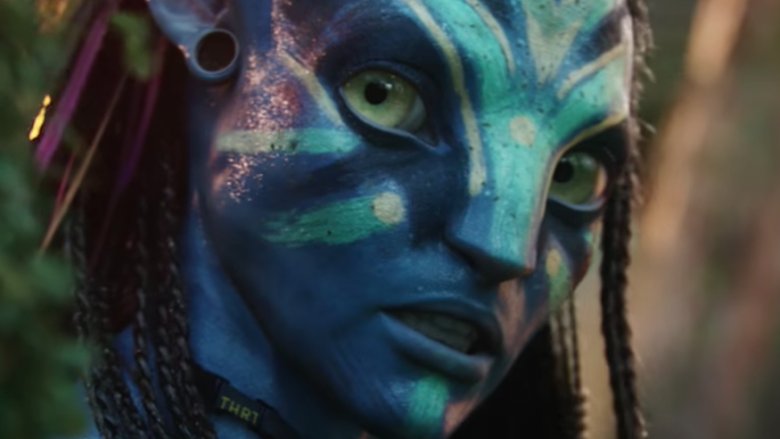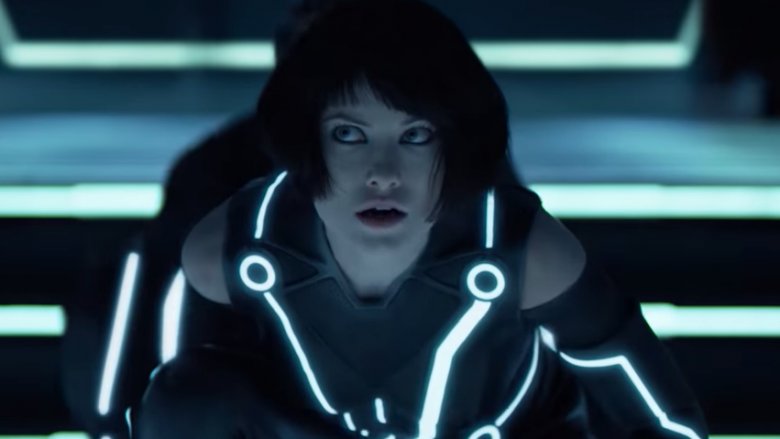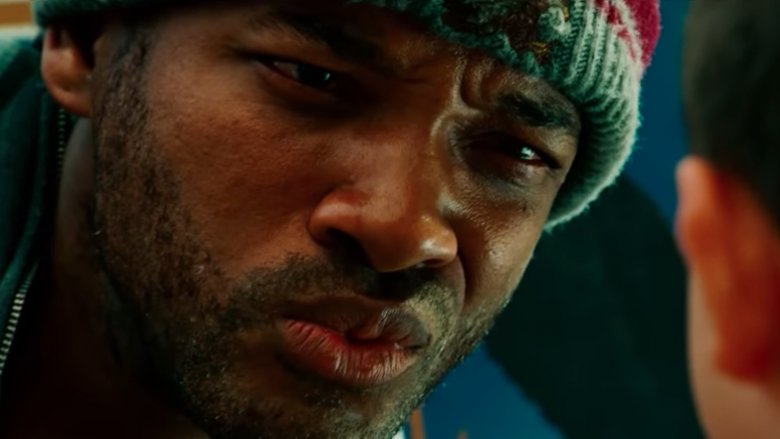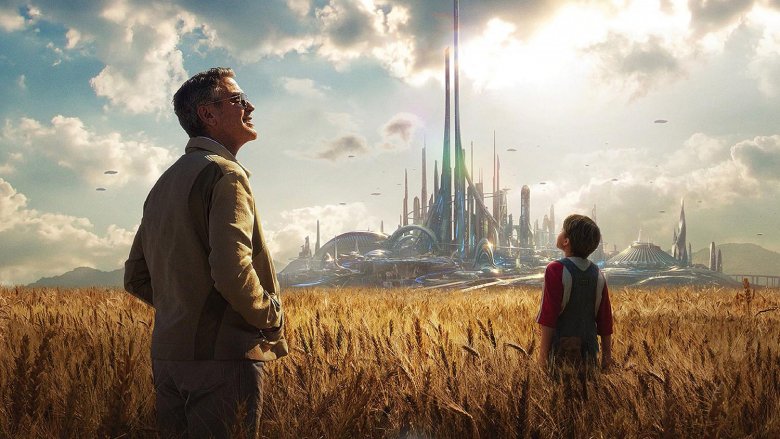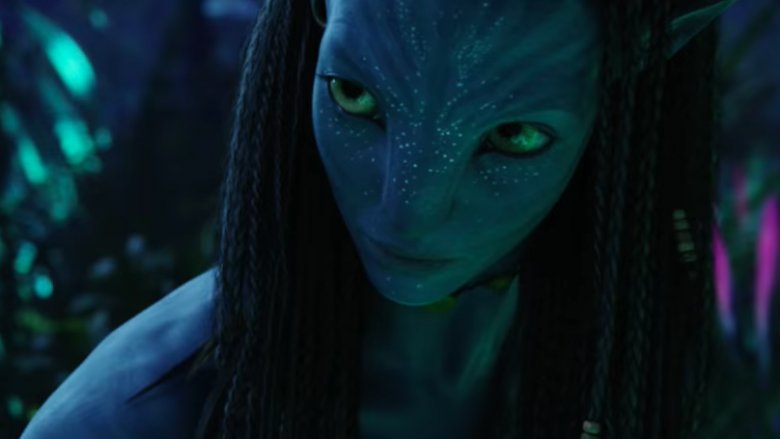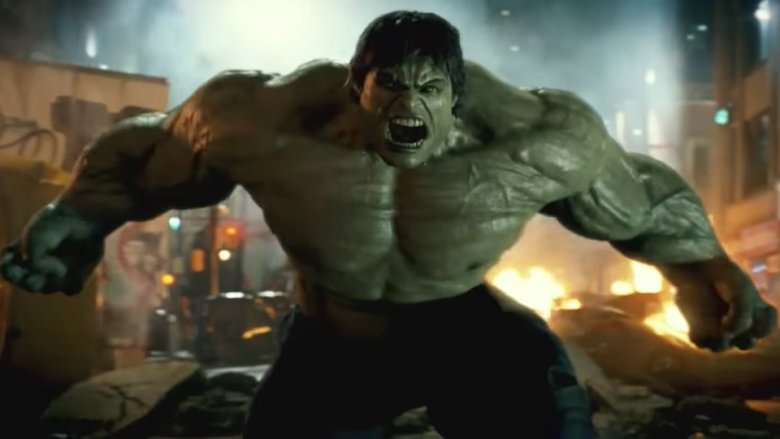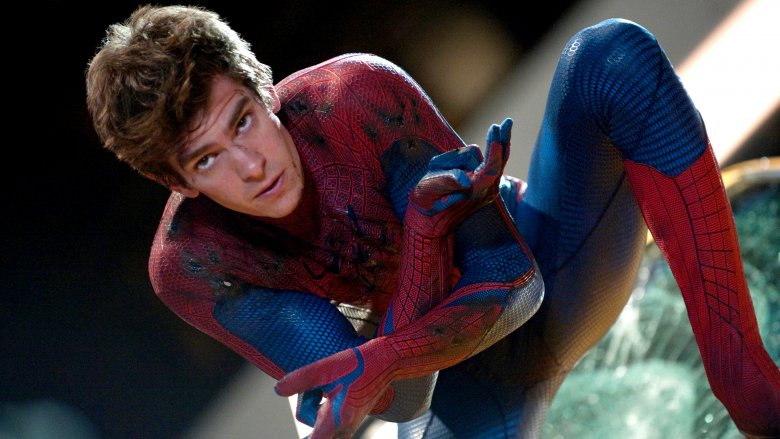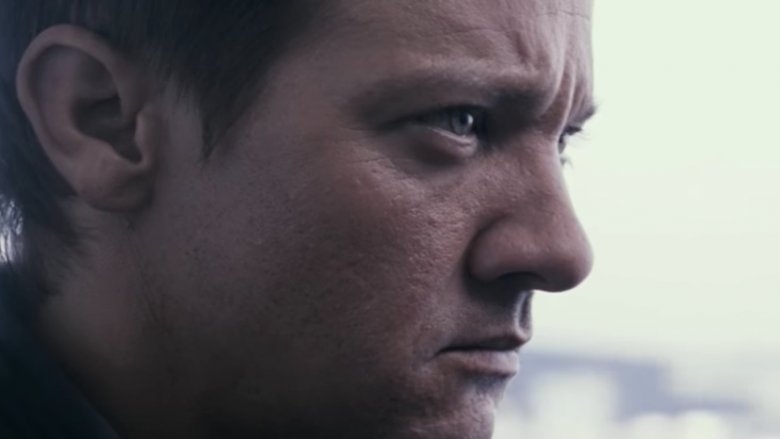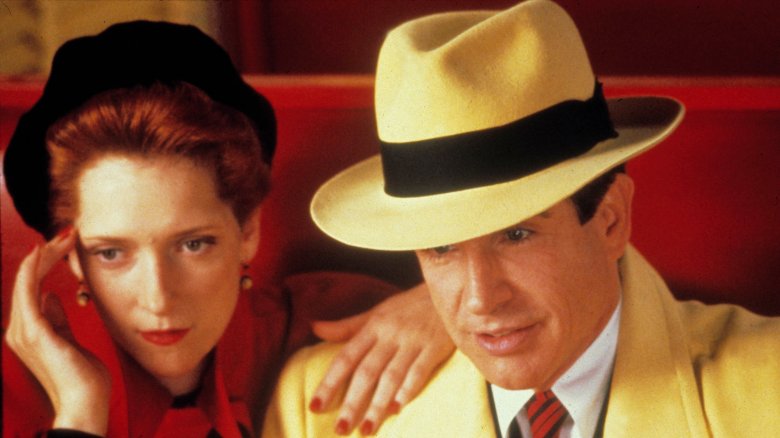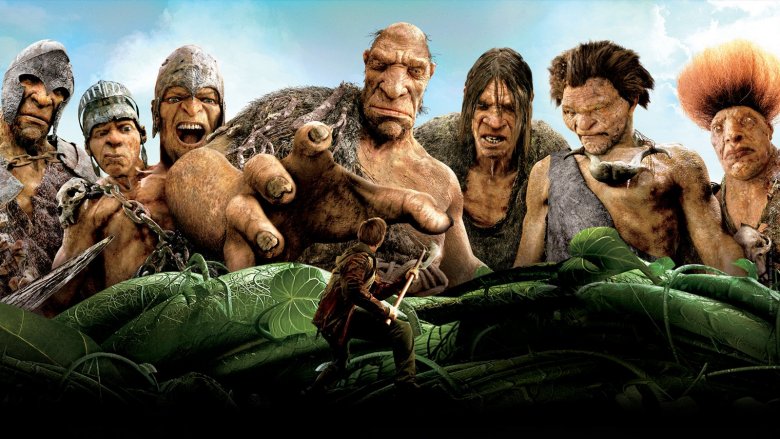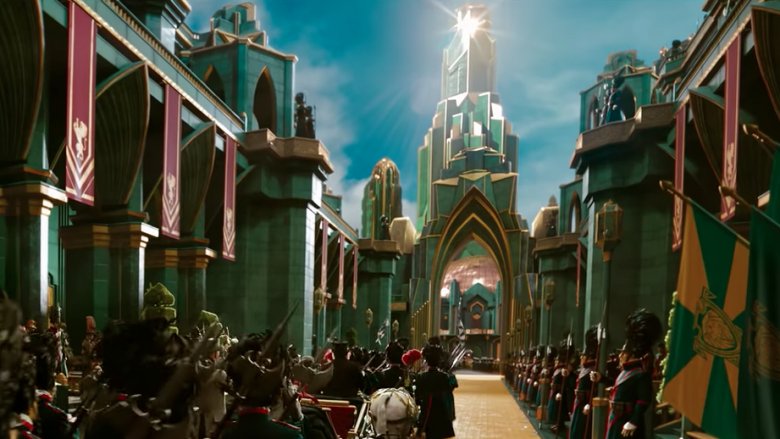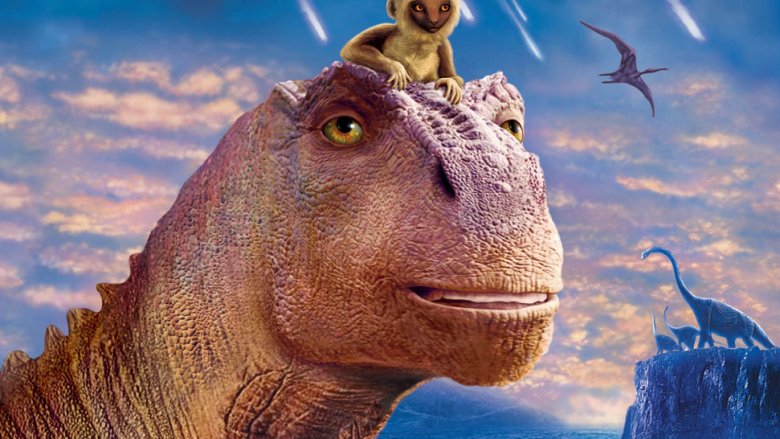The Least Memorable Number One Movies Of All Time
A movie's success at the box office is no indication of quality. Mediocre movies make hundreds of millions of dollars all the time, sometimes even enough to spawn entire franchises, and plenty of great films have bombed at the box office. Sometimes advertising campaigns fail to connect or a movie reaches audiences before they're ready for what it has to offer. But what about the films that fall in the middle of this spectrum — the ones that debut on top of the box office, only to fade into obscurity? Maybe they're only passable, not particularly memorable to begin with. Perhaps their legacies fall victim to crowded markets, or maybe the cutting edge technology that made them a draw to begin with becomes dated. We've taken a long look at the hits that failed to leave any sort of significant cultural impression, all in the name of bringing you the least memorable Number One movies of all time.
The Karate Kid isn't better the second time around
2010's The Karate Kid is less a remake of the '80s high school movie classic and more a reimagining, borrowing the core concepts of the original film. It accentuates the fish-out-of-water element of the source material by having Jaden Smith's Dre Parker move from Detroit to China, where he meets the enigmatic Mr. Han (Jackie Chan), who teaches him the ways of kung fu to help in dealing with some school bullies. It seemed to have all the makings of a hit and the beginning of a new era for the franchise. While the former proved to be true, the latter didn't.
After debuting at No. 1 and making bank during its box office run, the film never caught on like the original. It may come down to substituting simple charm with elaborate martial arts. It also doesn't help that the film focuses on younger kids than the originals did, making it far more cringe-inducing at times. Now that the original franchise has been revived for TV (and considering how well-received it's been), the film's long-gestating sequel seems unlikely to leave development hell anytime soon.
Tron: Legacy's lack of legacy
Hedging your bets on an expensive sequel to a long-dormant cult classic seems like a bold decision, but Disney went for it with 2010's Tron: Legacy. The film hit screens nearly 30 years after its predecessor, and made a solid impression. Featuring some stunning special effects, bold sci-fi storytelling, and a killer soundtrack by Daft Punk, it seemed Tron was back — until it wasn't.
It seems that killer special effects and weird, esoteric sci-fi storytelling are all for naught if they aren't anchored in compelling characters. Sam Flynn, the protagonist played by Garrett Hedlund, is a bland lead whose every line of dialogue seems to be ripped from a list of the most popular movie phrases of all time. All the lightcycle sequences in the world couldn't get audiences interested in his story. Plans for a sequel stalled, and aside from the short-lived (but admittedly excellent) animated series Tron: Uprising, it looks like Tron: Legacy may be the last we see of the world of the Grid for a while.
Hancock tries a new approach to heroes
The summer of 2008 featured the release of Iron Man, The Dark Knight, and The Incredible Hulk. Throw in a cinematic adaptation of Mark Millar and JG Jones' Wanted, and it's safe to say it was a summer ruled by comic book adaptations. However, there was a fourth superhero movie that dropped that summer, one that was a huge box office success and relatively well received by audiences. We're talking, of course, about the Will Smith vehicle Hancock.
The film, which tells the story of an alcoholic slacker superhero who is presented with the opportunity to clean up his act and make a real difference, went on to become the fourth-highest grossing movie of 2008. However, its timing has been its disadvantage in the long run. With recognizable name brand superhero movies coming out every other month these days, projects like Hancock have an uphill battle to fight for attention. A sequel has since been discussed, but a decade of Marvel and DC superhero movies dominating the box office seems to have put the world of Hancock on ice.
Tomorrowland fails to inspire
Films based on Disney theme park attractions tend to be hit or miss. On one hand, the Pirates of the Caribbean franchise is a huge success. On the other, the less said about The Country Bears, the better. In 2015, it seemed Disney would have something far more in the realm of the former with Tomorrowland. Every facet of the production featured all-stars in their field, from director Brad Bird and writer Damon Lindelof to the film's lead, George Clooney. On its opening weekend, it managed to snag the number-one spot.
However, reception was middling at best, split almost perfectly down the middle with a 49 percent approval on Rotten Tomatoes. Critics and audiences alike found it uneven, at times enthralling and exciting and at others utterly incomprehensible. Soon hopes of a new Disney franchise were halted and the film petered out in the box office. Despite the high expectations preceding its arrival, it's proven to be a summer blockbuster most viewers forgot as soon as they left the theater.
Avatar makes money, not fans
When Avatar hit theaters, box office records were mowed down in its path like trees in front of industrial bulldozers. It also garnered critical acclaim, even scoring a Best Picture nomination at the Oscars. It seemed like a movie we'd be talking about for a very long time. In a genuinely shocking turn, we didn't.
Avatar has become perhaps the most notable instance of a massively popular film fading into irrelevance. Maybe it's the fact that viewers have since realized that the film's story is largely derivative, or maybe the real draw was the film's stunning 3D which makes for a viewing experience that can't really be replicated outside a movie theater. Ultimately, there are arguments against all of these — plenty of other derivative movies have been more memorable, and even without the 3D, the special effects are still stunning. It's a tough question to answer. All we know is that people aren't nearly as excited about the sequels in development today as they might have been in 2010.
The Incredible Hulk gets overshadowed
The Incredible Hulk is a perfectly decent superhero movie with some great moments and killer performances. Edward Norton is a great choice for Bruce Banner, and Tim Roth's villainous Abomination has a real menace that is, at times, genuinely frightening. It also made good money at the box office, debuting at the top spot over its opening weekend. Unfortunately it's also a movie that audiences — and Marvel — have seemed eager to forget.
The film came out between Iron Man and The Dark Knight, two absolute game-changers in superhero cinema, and it got lost in the shuffle. Pair this with Norton and Marvel parting ways and Mark Ruffalo stepping in as Banner, and The Incredible Hulk was left on the fringes of the Marvel Cinematic Universe. It was a genuine surprise to see William Hurt reprise his role as Thaddeus "Thunderbolt" Ross in 2016's Captain America: Civil War. The Incredible Hulk now feels like a sort of relic, the last Marvel film to drop before the Cinematic Universe Era kicked into high gear. As the MCU sped along, The Incredible Hulk was left in the dust. Nobody seemed to notice.
Spider-Man should be more Amazing
There are three certainties in life: death, taxes, and Spider-Man movies making a lot of money. From the first big-screen adaptation of everyone's favorite web-slinger to the character's MCU debut in Spider-Man: Homecoming, Spidey movies have never been anything less than box office successes. Marc Webb's The Amazing Spider-Man and The Amazing Spider-Man 2 were hugely successful, well-received critically, and yet completely failed to make any sort of lasting impression.
The problem comes down to how transparent the films are about setting up a big superhero franchise to compete with the MCU. Every decision, from Peter Parker being a skateboarder to Dane DeHaan's bizarre Green Goblin costume, reeks of calculation, of studio decision-making. Spidey is a character that, at his core, is all heart. The Amazing Spider-Man and its sequel may have been enjoyed by filmgoers at the time, but the cold, calculating vibe they give off caused the audience to lose interest in the long run. When an opportunity presented itself, Sony struck a deal with Marvel and scrapped Webb's planned sequels.
The Bourne-less Legacy
The Bourne franchise redefined action movies for a generation — and did so with Matt Damon in the lead. With the trilogy's story revolving around his character Jason Bourne, it would seem ill-advised to make an installment of this series that doesn't feature him at all. That didn't stop the studio from trying in 2012 with The Bourne Legacy, though. Fortunately, the film could be a whole lot worse. Unfortunately, you'd be hard-pressed to find anyone that remembers it even happened.
The studio brought in Jeremy Renner as Aaron Cross, a new black ops agent to anchor the story. Bourne is never seen in person in the film. It's about as good as a Bourne movie that doesn't actually feature its title character could be, but that hasn't really proved to be enough in the long run. Despite debuting in the top spot at the box office, Renner was such a dud as the series' new lead that Damon returned for 2016's Jason Bourne. Now that he's back we doubt we'll be seeing a solo Aaron Cross film again any time soon.
Dick Tracy can't compete with progress
Warren Beatty started developing his live-action adaptation of the cartoon sleuth Dick Tracy as early as 1975. It finally hit screens in 1990, both directed by and starring Beatty. The film proved a smash hit, garnering solid reviews, a slew of Oscars, and made great money at the box office.
Unfortunately, there's nothing it does well that hasn't been done better elsewhere today. Be it the script's toeing of the line between camp and comedy, the over-the-top production design, or the way it brings together an all-star cast, every element that made Dick Tracy a hit in 1990 has since been one-upped by other comic book films. Tim Burton and Joel Schumacher's Batman films are the go-to for comic book camp, while Sin City far more effectively utilizes inventive production design to replicate comic book aesthetics. Dick Tracy has been largely forgotten by comic fans over the years. It's not a bad film. The evolution of comic book movies has simply stripped from it what once made it so special.
Jack slays giants and attention spans
Killer special effects can only take a movie so far, and you need look no further than Jack the Giant Slayer as evidence. An action-fantasy reimagining of the tale of Jack and the Beanstalk, the film's original release date had to be moved back nine months in order for the special effects to be finished. The result is, admittedly, visually quite spectacular. Unfortunately, that's just about all the movie has going for it.
Action fantasy is a hard sell for audiences to begin with. That Jack doesn't offer up much in terms of compelling characters or an involving story beyond those effects served as something of a death sentence. It debuted in first place at the box office, but failed to ever really build up steam, coming and going with little fanfare — and leaving director Bryan Singer free to return to the X-Men franchise.
Oz the Fine and Forgettable
Sam Raimi followed up his inspired 2009 horror entry Drag Me To Hell with a fresh take on the lore of Oz. 2013's Oz the Great and Powerful boasts an all-star cast that includes James Franco as Oscar Diggs (the man who would become the Wizard of Oz) and Mila Kunis as the Wicked Witch of the West. Throw in some stunning special effects and Raimi's trademark quirk, and you've got a charming reinvention. The film made a decent critical and financial impression upon release.
However, the years haven't been particularly kind to its legacy. Despite the stars being signed on for sequels, Raimi has stated he has no plans to return to Oz any time soon. With a number of fairytale and fantasy adaptations and reimaginings hitting screens in the years since and subsequently overshadowing any of the hype surrounding it, Oz the Great and Powerful has become more of a footnote than a headline.
Dinosaur goes extinct
Moviegoers sure do love dinosaurs. From Jurassic Park to The Land Before Time, throwing a T-rex on the big screen is a safe bet for studios looking to get a return on their investment. Disney knew this when they greenlit 2000's Dinosaur, which utilized what were at the time cutting-edge visual effects. It was a massive hit at the box office and critics found it pretty enjoyable as well. The only problem? Those effects weren't so cutting-edge a few years later.
It doesn't help that the film's story isn't particularly memorable, and isn't enough to distract from the dated animation. Additionally, it was never integrated into the world of Disney the way that other newer films like The Princess and the Frog or Frozen have been. There's no merchandise, no presence in advertising, no inclusion in the canon Disney establishes their animated films as being a part of outside of a ride at Animal Kingdom. It's tough to remember a movie exists when the studio itself seems to want you to forget it.
